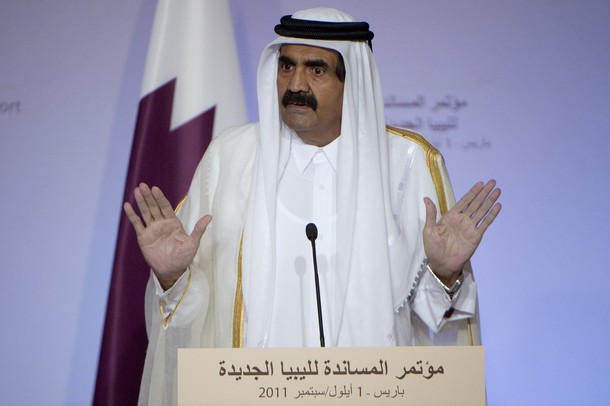
From David B. Roberts, Foreign Affairs: Qatar’s actions in Libya took most analysts by surprise when, in March, it sent six Mirage fighter jets (which likely represented the majority of Qatar’s operational fighter strength) to join in NATO air operations. This move signaled a qualitative change in Qatari foreign policy. Over the years, the country has involved itself (with mixed success) in a range of international disputes: In 2008, it mediated a successful resolution to the 18-month-long political stalemate in Lebanon, and in recent years has facilitated temporary agreements between the Yemeni government and the Houthi rebels. But never before has Qatar so overtly supported one side or made such an active intervention.
Nor were fighters the only matériel the emirate sent the rebels. In April, Qatari transport aircraft regularly departed Doha with armaments for the rebels, including French-made Milan antitank missiles and Belgian-made FN assault rifles. Qatari Prime Minister Sheikh Hamad bin Jassim al-Thani declared that Qatar was sending "defensive" weaponry to the rebels, but news accounts from Tripoli suggest the support went even further. Qatari special forces reportedly provided basic infantry training to Libyan rebel fighters in the Nafusa Mountains, to the west of Tripoli, and eastern Libya. The Qatari military even brought Libyan fighters back to Doha for special exercises. And in the final assault on Qaddafi’s Bab al- Aziziya compound on August 24, Qatari special forces were seen on the front lines of the fight. . . .
It is instructive, for example, to contrast Libya with Syria. If the Qatari elite had the ability and opportunity, they would likely choose to intervene to stop Syrian President Bashar al-Assad’s brutal crackdown against dissent, if for humanitarian reasons alone. Moreover, as a Sunni state wary of the expansion of Shia power throughout the region, Qatar would snatch the opportunity to turn Syria away from its current orientation toward Iran.
Yet it is all but impossible at the moment for Qatar to intervene in Syria. There is no international consensus for direct action; meanwhile, Syria’s security forces are better organized and trained than those in Libya and would present a stiffer challenge. Unlike in Libya, the geography of Syria does not offer thousands of miles of empty space, and there is no section of the country that is already in rebel hands. Moreover, Syria is both a more complex and influential country than Libya, making intervention highly risky, perhaps impossibly so.
Still, even if it cannot always pursue as assertive a foreign policy as it may like, Qatar has a number of deep-seated, structural advantages that have allowed it to take on a more proactive role in the region. For starters, Qatar’s security is guaranteed by the United States via the huge Al Udeid U.S. Air Force base, which has the longest runway in the Middle East, and Camp As Sayliyah, which is the U.S. military’s largest pre-positioning base outside of the continental United States. As a result, Qatar can confidently send the majority of its fighter jets 1,800 miles away to Libya, even with a bellicose and infinitely larger neighbor — Iran — less than 125 miles to the northeast. . . .
What Qatar is after is at once much bigger but also more amorphous. As Qatar’s elite see it, being at the forefront of popular Arab opinion and defending fellow Arabs against an onslaught from a widely hated dictator is a priceless commodity, both at home and abroad. In the coming post-Qaddafi era in Libya, Qatar wants to act as a translator and guide for those seeking access. In so doing, Qatar may reinforce its role as a knowledgeable, central, and invaluable ally for Western countries. But Libya may remain the exception when it comes to Qatar’s approach toward overt intervention: For all its success in Libya, Qatar’s leaders are unlikely to forget that despite its growing diplomatic respect and economic clout, Qatar remains a small country in a precarious part of a volatile region.
David B. Roberts is Deputy Director of the Royal United Services Institute in Qatar. (photo: Getty)
Image: getty%209%2029%2011%20Emir%20hamad%20al%20thani.jpg
